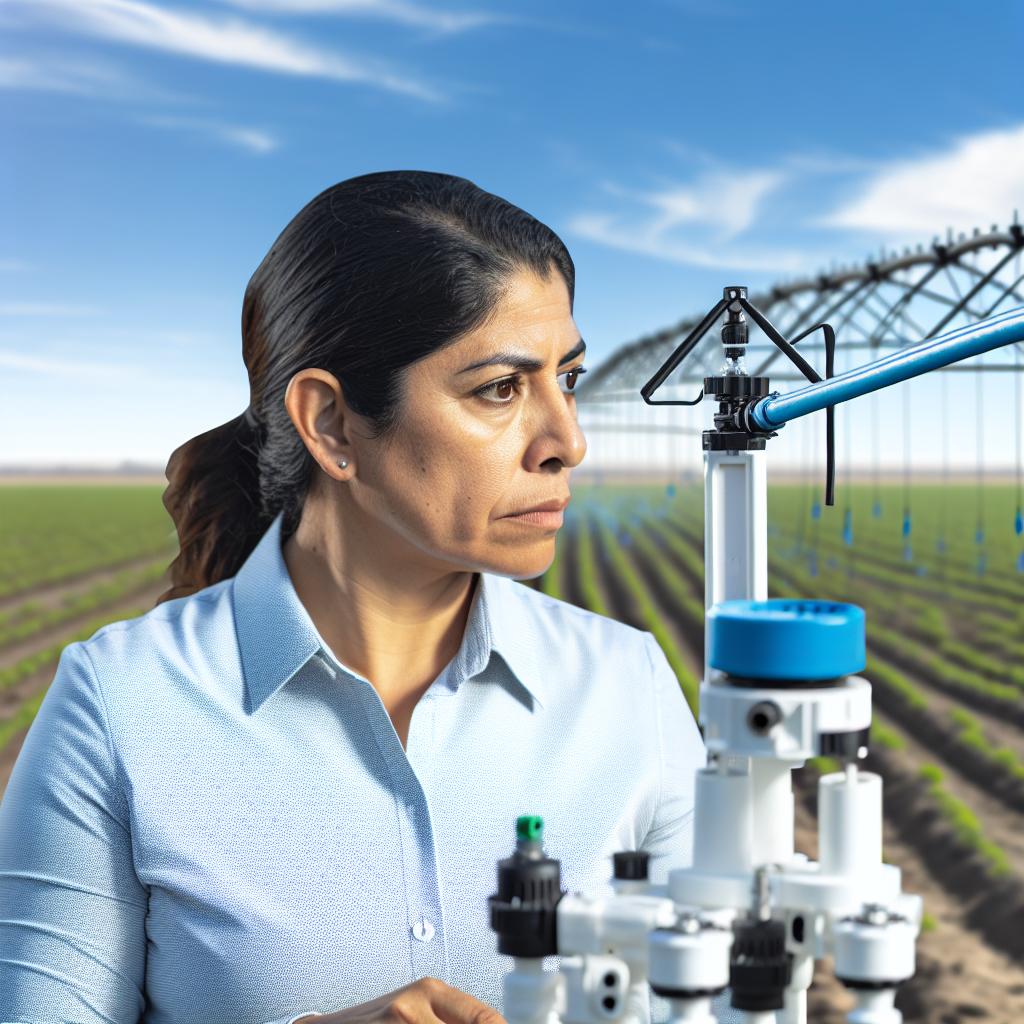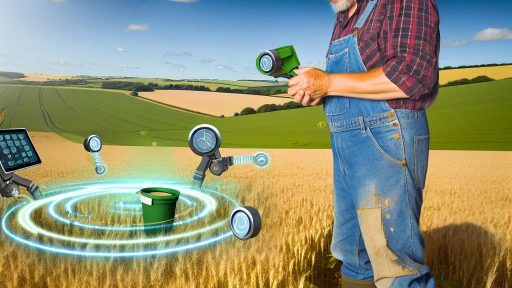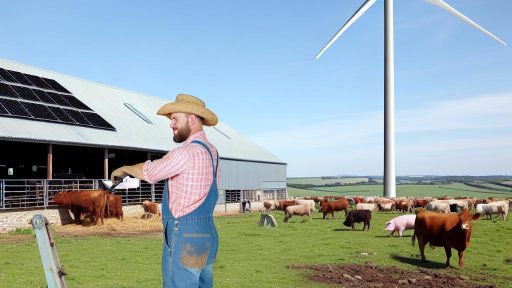Introduction to Smart Irrigation Systems and AI Integration
Smart irrigation systems optimize water usage for agricultural and landscaping needs.
With advancements in artificial intelligence, these systems have become more efficient.
AI integration enhances decision-making processes concerning irrigation schedules.
Benefits of Smart Irrigation Systems
Firstly, they conserve water effectively, which is vital in arid regions.
This technology minimizes runoff and water waste significantly.
Secondly, smart systems reduce labor costs through automation.
Farmers can spend less time managing irrigation systems due to automated controls.
Thirdly, these systems improve crop yields through precise watering.
Proper timing and water amounts boost plant health and growth rates.
Artificial Intelligence’s Role
Artificial intelligence analyzes weather patterns and soil moisture levels.
This analysis enables smarter irrigation decisions based on real-time data.
Moreover, AI predicts irrigation needs, adapting to changing environmental conditions.
These predictive capabilities enhance resource management in agriculture.
Features of AI-powered Smart Irrigation Systems
One important feature is sensor technology that monitors soil moisture content.
Additionally, weather sensors provide updates on climate conditions for effective planning.
Transform Your Agribusiness
Unlock your farm's potential with expert advice tailored to your needs. Get actionable steps that drive real results.
Get StartedRemote access through smartphone applications enhances user convenience.
Thus, farmers can manage their irrigation systems from anywhere at any time.
The Role of AI in Data Collection and Analysis for Irrigation
Introduction to AI in Irrigation
Artificial intelligence transforms the irrigation landscape significantly.
It enhances both data collection and analysis in agricultural practices.
Farmers benefit from improved efficiency and resource management.
Importance of Data Collection
Accurate data collection is essential for effective irrigation management.
AI technologies streamline the process of gathering relevant information.
This includes soil moisture levels, weather conditions, and crop requirements.
By utilizing sensors and IoT devices, farmers obtain real-time data.
Such data helps in making informed irrigation decisions.
Methods of Data Collection
Several methods exist to collect data for AI-driven irrigation systems.
- Soil moisture sensors measure water content accurately.
- Weather stations gather data on rainfall and temperature.
- Drones survey crop health and growth patterns.
These methods provide a comprehensive view of irrigation needs.
AI Analysis Techniques
AI algorithms analyze data to optimize irrigation schedules.
Machine learning models learn from historical data patterns.
These models predict optimal watering times and quantities.
Subsequently, they reduce water waste while maximizing crop yield.
Benefits of AI Analysis
Benefits of using AI for data analysis in irrigation are significant.
- Improved water conservation leads to sustainability.
- Increased crop yields boost farmers’ profits.
- Reduced labor costs enhance overall efficiency.
Farmers gain insights into their irrigation practices’ effectiveness.
Real-World Applications
Various companies implement AI in irrigation systems successfully.
AgriTech Solutions utilizes AI algorithms to monitor crop moisture.
SmartFarm Technologies offers AI-powered irrigation controllers.
These innovations lead to proactive management of water resources.
Case Studies
Multiple farms have reported success with AI-driven irrigation.
Sunny Valley Farm implemented real-time monitoring, resulting in 30% water savings.
Showcase Your Farming Business
Publish your professional farming services profile on our blog for a one-time fee of $200 and reach a dedicated audience of farmers and agribusiness owners.
Publish Your ProfileGreen Meadows used predictive analytics to optimize irrigation schedules, enhancing yield by 20%.
These case studies illustrate AI’s transformative impact on irrigation.
Benefits of Smart Irrigation Systems in Agriculture
Water Conservation
Smart irrigation systems significantly reduce water consumption.
These systems utilize data-driven insights to optimize watering schedules.
Consequently, they address the challenges of water scarcity effectively.
Increased Crop Yield
Farmers experience enhanced crop yields with smart irrigation technologies.
These systems ensure crops receive optimal moisture levels at all times.
As a result, healthier plants are less prone to disease and stress.
Cost Efficiency
Smart irrigation helps in cutting down water and energy costs.
By minimizing water waste, these systems decrease utility bills.
Moreover, farmers can redirect savings towards improving farm operations.
Remote Monitoring and Control
With smart irrigation, farmers can monitor systems remotely.
Mobile applications provide real-time insights and control capabilities.
This feature allows for quick adjustments based on environmental conditions.
Environmental Impact
Smart irrigation systems contribute positively to environmental sustainability.
They reduce runoff and prevent the depletion of natural water sources.
Additionally, these systems promote healthier ecosystems surrounding farms.
Learn More: Blockchain Innovations Driving Efficiency In Farming Supply Chains
How AI Algorithms Improve Water Efficiency
Understanding AI in Irrigation
AI plays a crucial role in modern irrigation systems.
It analyzes data in real-time to optimize water usage.
This technology reduces waste and enhances crop yield.
Data Collection and Analysis
Data collection is the foundation of AI-driven irrigation.
Sensors gather information on soil moisture and weather conditions.
This data feeds into AI algorithms for processing.
AI identifies patterns and predicts water needs accurately.
Automated Decision-Making
Automated systems take action based on AI recommendations.
This ensures timely irrigation without human intervention.
Farmers can program settings and let the system manage itself.
This significantly reduces labor costs and human error.
Benefits of AI-Enhanced Irrigation
- Increased water efficiency through precise delivery.
- Improved crop health due to optimal moisture levels.
- Reduction in water usage leading to cost savings.
- Enhanced ability to adapt to changing environmental conditions.
Case Studies of Successful Implementations
Many farms have successfully integrated AI irrigation systems.
Sunny Acres Farm reported a 30% decrease in water usage.
Green Valley Orchards saw a 20% increase in crop yield.
These successes illustrate the potential of AI in agriculture.
Discover More: Security Considerations When Choosing Farm Management Software
Case Studies: Successful Implementations of AI-Powered Irrigation
Innovative Solutions in Agriculture
AI-powered irrigation systems have transformed modern agriculture.
These systems optimize water usage by predicting plant needs.
They analyze soil moisture levels and weather data in real time.
Example of a Winery in California
Frosty Vineyards in Napa Valley implemented an AI irrigation system.
This system monitors temperature and humidity very effectively.
As a result, it reduced water consumption by 30%.
Showcase Your Farming Business
Publish your professional farming services profile on our blog for a one-time fee of $200 and reach a dedicated audience of farmers and agribusiness owners.
Publish Your ProfileAdditionally, it improved grape yield significantly.
Revolutionizing Urban Landscaping
EcoGreen Landscapes in Melbourne upgraded their irrigation methods.
Their AI system uses sensors throughout the landscaped areas.
This allows for precise watering schedules based on weather conditions.
Consequently, they achieved a 40% reduction in water waste.
Enhancing Crop Production in Developments
Green Fields Co. in Kansas adopted AI-driven irrigation technology.
This initiative helped farmers make data-driven decisions swiftly.
Using predictive analytics, crop yields increased by 25%.
Moreover, farmer incomes rose due to better harvests.
Benefits of Implementing AI Irrigation
AI-powered irrigation presents numerous advantages for users.
- It conserves valuable water resources.
- It increases agricultural efficiency significantly.
- It enhances crop quality and production rates.
- It reduces labor costs associated with manual irrigation.
Future Prospects in Smart Irrigation
As technology advances, AI irrigation systems will become smarter.
They will integrate with additional smart farming solutions.
Farmers will gain even greater insights into environmental conditions.
This promises a future with better resource management and sustainability.
Find Out More: Ethical Considerations In Agricultural Biotechnology

Challenges and Limitations of Smart Irrigation Technologies
Technical Limitations
Smart irrigation systems often face technical limitations.
Connectivity issues can disrupt system performance.
In rural areas, reliable internet access remains a challenge.
Additionally, sensor malfunctions can lead to inaccurate data.
This affects the overall efficiency of the irrigation systems.
Cost Implications
The upfront cost of smart irrigation technologies can be significant.
Many farmers hesitate to invest in advanced systems.
Ongoing maintenance and subscription fees may deter adoption.
Financial constraints limit access for smaller farms.
Data Management Challenges
Smart irrigation generates vast amounts of data.
Managing this data can be overwhelming for farmers.
Data analysis requires expertise that many may lack.
Furthermore, data privacy concerns can arise.
Farmers need assurance that their data remains secure.
Environmental Considerations
While smart irrigation aims to promote sustainability, it faces scrutiny.
Some systems require significant energy to operate.
This can offset environmental benefits.
Moreover, technological waste can contribute to pollution.
Balancing innovation and environmental impact is crucial.
Regulatory Barriers
Regulatory frameworks for smart irrigation often lag behind technology.
Farmers can encounter legal complications when implementing new systems.
Conflicting regulations across regions may further complicate matters.
Clear guidelines are necessary to facilitate adoption.
Education and Training Needs
Farmers require education to navigate smart irrigation technologies.
Training programs must be made available and accessible.
Showcase Your Farming Business
Publish your professional farming services profile on our blog for a one-time fee of $200 and reach a dedicated audience of farmers and agribusiness owners.
Publish Your ProfileWithout proper education, many may struggle with adoption.
Awareness campaigns can help highlight the benefits and usage.
Investing in training is essential for widespread acceptance.
You Might Also Like: Leveraging Digital Finance Tools To Boost Agricultural Productivity
Future Trends: Next-Gen AI Innovations in Irrigation Systems
Introduction to AI in Irrigation
Artificial Intelligence is revolutionizing the way we manage water in agriculture.
Smart irrigation systems use AI to enhance efficiency and conserve water resources.
This technology analyzes various data points in real time.
Consequently, farmers can make informed decisions about their irrigation strategies.
Key Innovations in AI for Irrigation
Recent advancements have paved the way for smarter irrigation solutions.
For instance, machine learning algorithms predict optimal watering schedules.
These algorithms assess factors like soil moisture and weather forecasts.
Additionally, AI-driven sensors monitor crops continuously.
These sensors provide crucial feedback to adjust water delivery precisely.
Integration with IoT Technologies
IoT technologies are integral to modern smart irrigation systems.
These interconnected devices collect and exchange data seamlessly.
As a result, they enhance irrigation performance and responsiveness.
This integration allows farmers to access real-time insights remotely.
Farmers can control irrigation systems through smartphones or tablets.
Benefits of AI-Powered Irrigation Systems
AI-powered systems significantly reduce water consumption.
This technology minimizes waste by applying water only when necessary.
Also, it boosts crop yields by ensuring optimal growing conditions.
Farmers experience improved resource management and cost savings.
Importantly, these systems contribute to sustainable agricultural practices.
Challenges and Considerations
Despite the benefits, there are challenges in adopting AI-driven systems.
For many farmers, initial setup costs can be prohibitive.
Moreover, technical expertise is essential to operate these systems effectively.
Addressing these challenges is crucial for broader adoption.
Furthermore, ongoing support and education for farmers is necessary.
The Future of Smart Irrigation
The future of irrigation technology looks promising with AI advancements.
Continuous improvements will lead to more sophisticated monitoring capabilities.
A greater number of farms will adopt smart irrigation practices globally.
As more data becomes available, AI will improve decision-making processes.
This evolution will ultimately enhance food security and environmental sustainability.
The Impact of Smart Irrigation on Sustainable Farming
Water Efficiency
Smart irrigation systems significantly improve water efficiency in agriculture.
They adjust watering schedules based on real-time data.
This capability reduces water waste and conserves valuable resources.
Farmers can optimize their irrigation practices using precise measurements.
Consequently, this leads to healthier crops and better yields.
Reduction of Environmental Impact
Smart irrigation directly reduces the negative environmental impact of farming.
By using less water, these systems lower the runoff of fertilizers and pesticides.
Showcase Your Farming Business
Publish your professional farming services profile on our blog for a one-time fee of $200 and reach a dedicated audience of farmers and agribusiness owners.
Publish Your ProfileThis reduces the contamination of local waterways.
Moreover, minimizing irrigation fosters healthier soil ecosystems.
The approach promotes sustainable farming practices to protect biodiversity.
Cost Savings
Implementing smart irrigation technology can result in significant cost savings for farmers.
Lower water usage translates into reduced utility bills.
Additionally, improved crop health decreases the need for expensive fertilizers.
Long-term investments in such systems pay off with higher efficiency and sustainability.
Enhanced Crop Yield
Smart irrigation systems enhance crop yield through optimized watering.
Crops receive the exact amount of water they need at the right times.
This precise control results in healthier plants and increased productivity.
Farmers can achieve higher-quality fruits and vegetables using these technologies.
As a result, they can meet market demands effectively.
Data-Driven Decision Making
These systems empower farmers with data-driven insights for better decision making.
Farmers can analyze weather patterns and soil moisture levels easily.
This leads to informed choices about resource allocation and scheduling.
In turn, this proactive approach fosters sustainable practices in agriculture.
Farmers can maximize efficiency while minimizing environmental impact.
Additional Resources
Developing AI to supercharge smart irrigation for farmers
Implementation of artificial intelligence in agriculture for optimisation …




